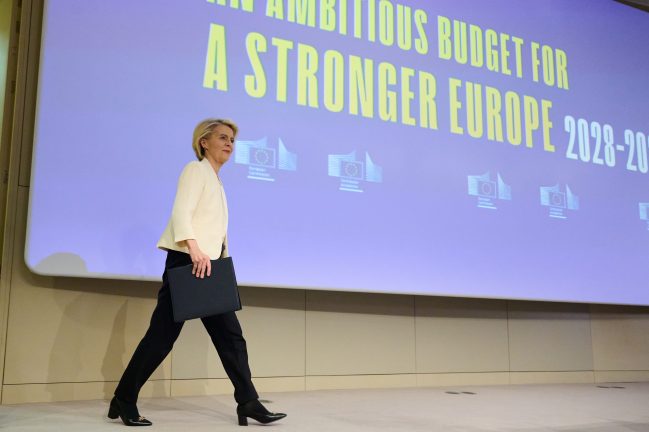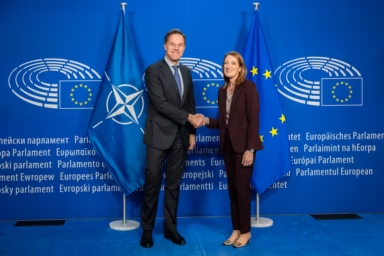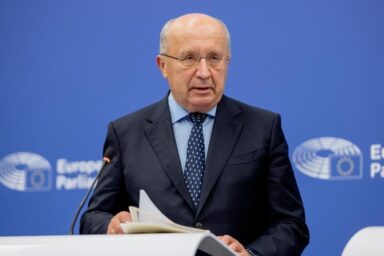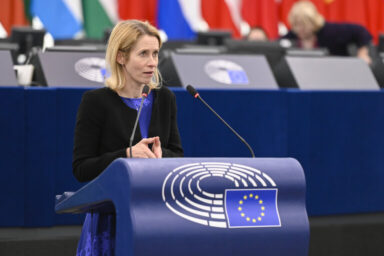The European Commission has fired the opening salvo of the upcoming battle for the Union’s next long-term budget for 2028–2034. Defence emerged as a tentative winner with a ten-fold funding increase over the status quo. As is customary, the proposal attracted much criticism. Commission President Ursula von der Leyen, however, insisted there is enough time to smooth things over.
The European Commission unveiled a proposed seven-year EU budget, or Multiannual Financial Framework, on Wednesday 16 July, along with the proposal for new own resources. EC President Ursula von der Leyen framed it as a “larger, smarter, and sharper” blueprint to confront geopolitical and economic challenges, worth €1.816tn. “It is a budget that matches Europe’s ambition, that confronts Europe’s challenges and that strengthens our independence,” she declared.
Read his lips: New taxes
However, her claim of a de facto €2tn budget – factoring in post-pandemic debt repayments – drew accusations of creative accounting. MEP Siegfried Mureșan (EPP/ROU), budget negotiator for Ms von der Leyen’s own political group, dismissed the method as “misleading”.
The proposal shifts priorities from traditional pillars like agriculture and regional development, which currently consume two-thirds of EU funds, toward defence, innovation, and crisis management. Farmers face a steep cut, with Common Agricultural Policy (CAP) funding slashed from €387bn to €300bn.
This was not a good start – neither on content nor on process. – MEP Johan Van Overtveldt (ECR/NLD)
Budget Commissioner Piotr Serafin outlined three new EU-wide taxes – on electronic waste, tobacco, and corporate profits – to service €25-30bn in annual debt repayments from the pandemic-era recovery fund. Combined with existing carbon border levies and emissions trading revenues, these own resources aim to raise €58bn yearly.
‘Not a good start‘
To the bemusement of many, Ms von der Leyen’s slideshow percentages for budget categories totalled a slightly North-Korea-like 101 per cent. More serious procedural tensions flared during Mr Serafin’s parliamentary briefing. Budget committee chair Johan Van Overtveldt (ECR/NLD) accused Ms von der Leyen of sidelining lawmakers: “We see that President von der Leyen is giving a press conference and apparently she’s giving more information than we get here.”
After a contentious two-hour grilling, it was not any better. Mr Van Overtveldt then concluded: “This was not a good start – neither on content nor on process,” a verdict met with applause from frustrated MEPs.
You might be interested
The budget plan drew much criticism on all sides. MEP Ciaran Mullooly (Renew/IRL) noted defence spending would rise fivefold even as farm budgets shrink by over 20 per cent. Dutch Finance Minister Eelco Heinen, in turn, called the overall sum “too high,” insisting “we should not always focus solely on how the EU can spend more, but rather on how existing funds can be spent better”. Germany and France had signalled they would summarily oppose increased contributions, citing domestic fiscal pressures.
MEP Tamás Deutsch (PfE/HUN), who hails from Hungarian PM Viktor Orbán’s party Fidesz, lambasted the plan as a “creative bookkeeping manoeuvre” benefiting only “Ukraine and the European Commission”. He accused Brussels institutions of “strengthening their powers” while leaving behind “farmers, the regions, and European entrepreneurs”.
A ten-fold defence boost
Defence emerged as a clear winner, with military mobility funding surging from €1.7bn to €17bn – a tenfold increase reflecting lessons from Russia’s war in Ukraine. The €410bn European Competitiveness Fund, detailed by Vice-President Stéphane Séjourné, allocates €130bn to defence and space projects.
Moreover, a €400bn crisis instrument, requiring unanimous member state approval, aims to expedite responses to shocks like pandemics or wars. Commissioner Serafin described it as a shortcut to avoid clunky existing mechanisms. However, Dutch officials immediately rejected any “new instruments for joint debt”.
Don’t try to sell this to us as a success. – MEP Herbert Dorfmann (EPP/ITA)
The proposal also includes €100bn for Ukraine’s reconstruction via an existing facility, despite Hungarian PM Viktor Orbán previously dismissing it as “shocking”. “The 100 billion are feeding into the Ukraine facility that exists already,” Ms von der Leyen retorted during her press conference, running simultaneously to the parliamentary committee meeting. “It has been put in place by the heads of state and government and in the co-legislative process that is necessary. The facility was filled with 50 billion euros at the midterm review. We did that one or two years ago and these 100 billion are a proposal to fill up this facility,” she said.
Health, agriculture shortchanged
By contrast, health received scant attention beyond a vague €22.6bn envelope shared with biotechnology and agriculture. If divided equally, health would secure just €5.5bn – marginally above the current EU4Health programme’s €5.3bn.
As expected, controversy surrounded agriculture subsidies, which traditionally swallow a third of the common budget. Agriculture Commissioner Christophe Hansen insisted the CAP remains “a standalone policy with guaranteed direct payments,” arguing the €300bn allocation “roughly remains the same” in real terms. Various early analyses, however, suggested a 25-30 per cent cut at 2025 prices, MEP Herbert Dorfmann (EPP/ITA) to retort: “Don’t try to sell this to us as a success”. His fellow parliamentarian Csaba Dömötör (PfE/HUN) accused Mr Hansen of “assassinating” the CAP.
The EC President proposed offsetting farm cuts through €865bn in flexible National and Regional Plans for projects like rural childcare centres. Ms von der Leyen claimed this would make financing “much more targeted, much more focused, it will come faster, and it’s much more transparent”. However, accessing these funds requires navigating complex combined streams from cohesion, social, and agricultural budgets.
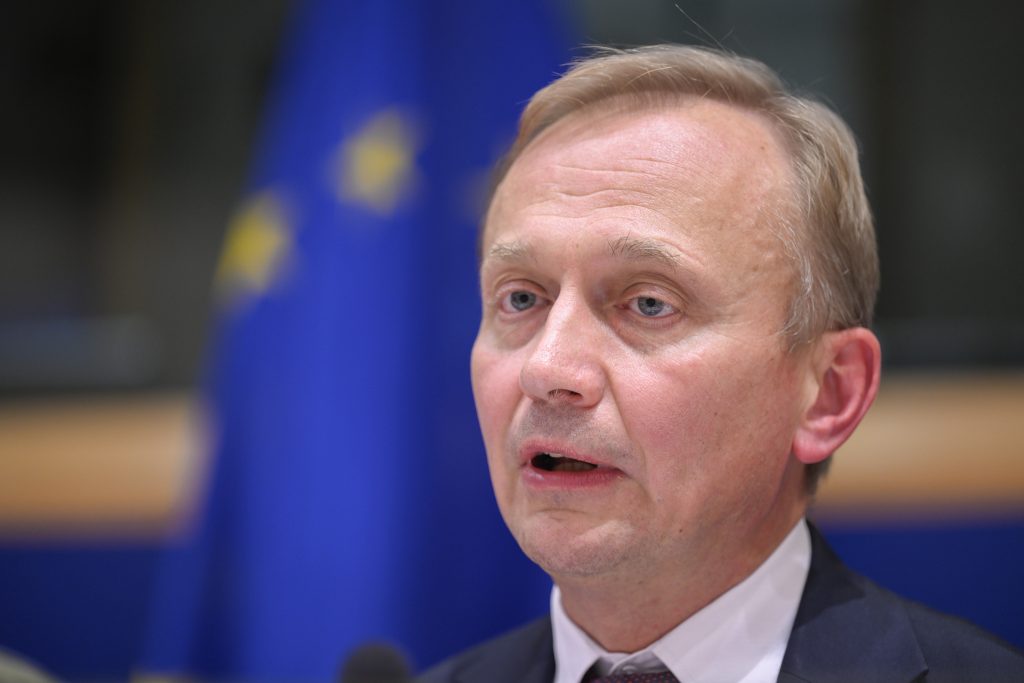
Séjourné: This is real money
Parliamentary co-rapporteur Carla Tavares (S&D/PRT), her group’s go-to budget person, vowed: “We will not allow the financing of our key priorities to be compromised by the repayment of NextGenerationEU (covid loans)”. MEP Jessika van Leeuwen (EPP/NDL) offered rare praise – but even she that warned reliance on national farm top-ups “could create unequal conditions between member states”.
In a separate press conference, EC Vice-President Stéphane Séjourné outlined the €410bn Competitiveness Fund’s focus on leveraging private investment through guarantees. In a jab at one-time Commission President Jean-Claude Juncker, he said: “This is real money, not theoretical economic multipliers.” He argued each euro could yield €20 in real-economy impact through guarantees while maintaining €410bn as direct funding.
Responding to scepticism about defence financing, Mr Séjourné noted allocations had increased fivefold with flexibility for evolving needs. Member states could direct resources toward joint procurement or dual-use infrastructure, pending legislative negotiations.
‘Slight improvement’ for net recipients
Challenged on reconciling the fund with the Draghi report’s €800bn annual investment call, Mr Séjourné countered that the €410bn represents only the EU’s contribution, complementing national budgets and private capital. He stressed 43 per cent would target industrial decarbonisation, including €67.4bn for green transitions, alongside €54.8bn for digital technologies and €22.6bn for health and biotech.
I never work with red lines. Democracy lives off negotiations. – Ursula von der Leyen, President of the European Commission
Horizon Europe’s budget would nearly double to €175bn over seven years, integrating space-related programmes. Non-EU participants like Switzerland would need to align with revised terms, though Mr Séjourné deferred specifics to the Budget Commissioner.
Ms von der Leyen acknowledged “understandable” resistance but expressed confidence in addressing “geopolitical and economic instability”. She ruled out resurrecting the NextGenerationEU recovery fund, instead promoting a €400bn crisis instrument requiring unanimous Council approval. Structural fund recipients like Greece would see “slight improvements”, though €835bn in flexible spending allows regions to redirect funds between priorities like digitalisation or clean energy.
No red lines
Pressed on Commission powers, Ms von der Leyen dismissed suggestions the budget incentivised her seeking a third term, stating it aimed to “future-proof” EU spending. As farmers threatened autumn tractor protests, the bloc braced for clashes between austerity-minded capitals and Parliament’s demands for greater firepower.
The Commission President repeatedly stressed that the unveiling of the proposal is just the beginning, and policymakers have 18 months to iron out their differences. „I never work with red lines,“ Ms von der Leyen said when asked if she was approaching the upcoming negotiations with any ironcast ideas. “Democracy lives off negotiations.“
